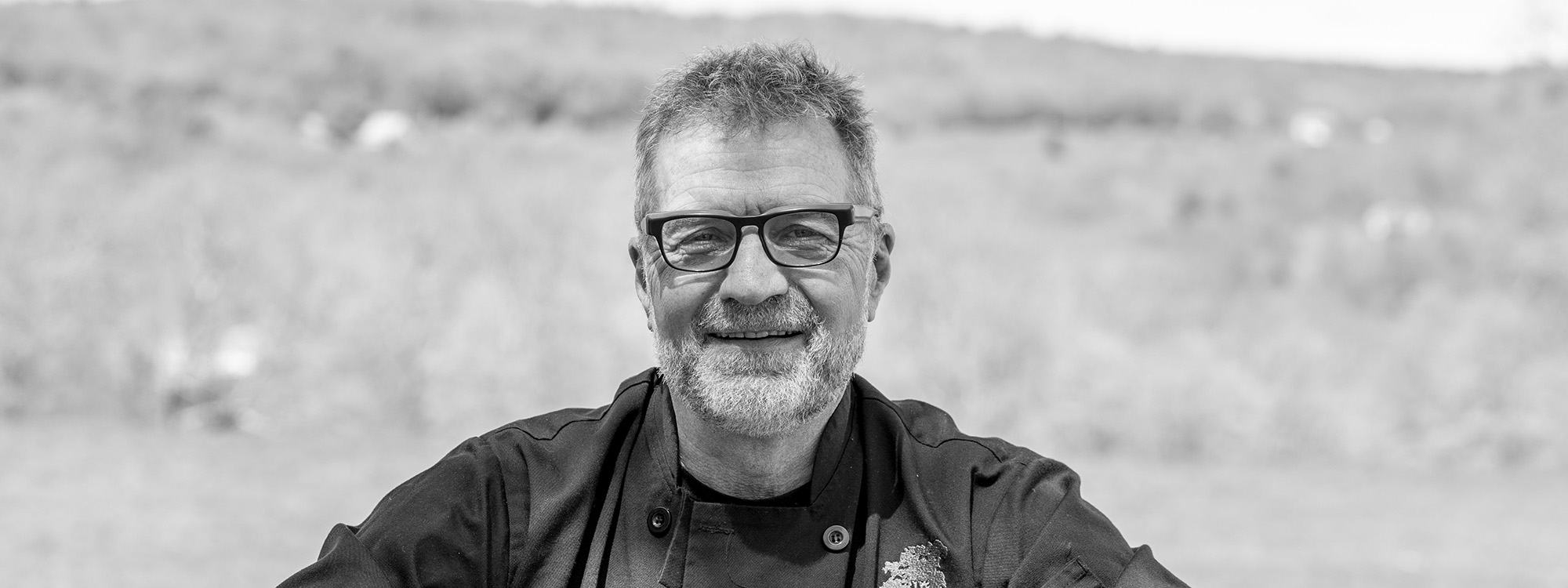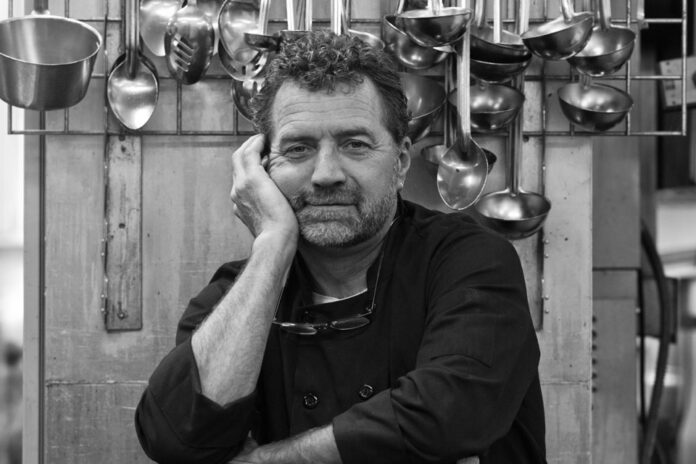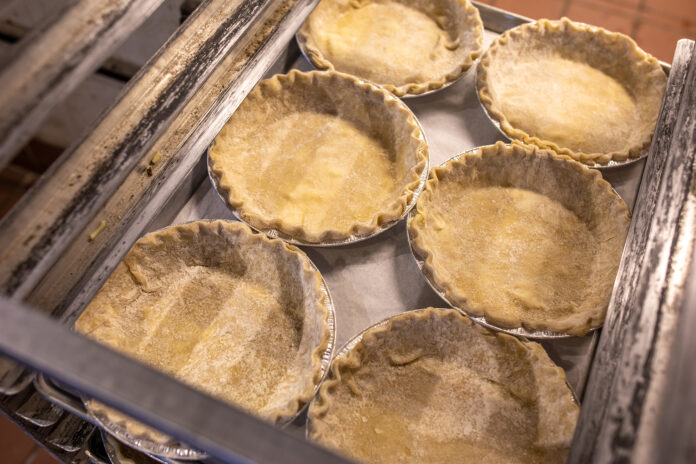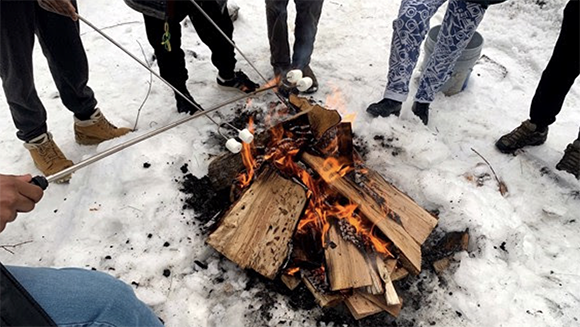Executive Chef Ready to Retire and Start a New Story
Marty Brennan-Sawyer, executive chef at The Putney School, knows the importance of perfect timing.
It takes hours for the massive wood-fired oven in the dining room to reach the right temperature. And when it does, there is a small window in which Brennan-Sawyer has to load the 40, 50, even 60 loaves of bread that will help feed hungry students for the next couple of days.
It doesn’t matter what else is going on — a conversation with a friend, a crisis in the kitchen … an interview about your upcoming retirement — in that moment when the dance between the readiness of the dough and the temperature of the oven cross streams, everything else comes to a halt so the yeast can rise into fluffy, crispy, handmade artisan deliciousness.
I have good intentions when I bake bread,” Brennan-Sawyer said. “It’s about wishing to do the best I can to take care of people. And this is how I’m able to do it. My way of saying ‘I love you’ is to feed you.”
Brennan-Sawyer has been feeding the Putney community for 34 years. Again, he knows the importance of perfect timing.
“I’ve been here a very long time and I love my life,” he said. “But life is a series of stories that you have. My wife is retired, my boys are out of college and going to have babies. They’re well on to their next stories. I’m still on this story and I can’t start the next story until this book closes.”
A Taste of Home
His time at Putney has been more like a great novel.
He and his wife moved to on-campus housing a few years after he started his job at the KDU. They watched their two kids blossom in a world full of knowledge and idealism: artwork, concerts and lectures, cows running in the field, cross country skiing out their back door, drinking sap from a bucket, showing ‘their chickens’ off to their cousins — before they grew old enough to attend The Putney School themselves.
It was this amazingly rich environment to engage and participate in with my children and my wife,” Brennan-Sawyer said. “It has been home for us in so many rich ways.”
Perhaps that’s why he strives for the dining experience at Putney to feel like you’re sitting down at the table for a home-cooked meal.
“Marty over the years has been able to bridge the need to serve a large amount of food, with what you remember eating at a table with a family of five or six,” said Assistant Head of School and CFO Randy Smith.
Added Head of School Emily Jones, “Marty has always understood the emotional side of food, the way food ties us to our homes and families. When I see tomato soup and toasted cheese sandwiches for lunch, it means that Marty somehow thinks we need comfort food, and sometimes wonder what he knows that I don’t.”
No media items found.
Yearbook photos of Brennan-Sawyer during his time at Putney.
Throughout three decades spent building the KDU program, Brennan-Sawyer has expanded on the concept of school cafeteria, transforming a communal dining experience for nearly 300 people into a special place for individual students and staff to enjoy a plate of food that reminds them of home.
Which he knows is very different for someone from Kazakhstan than for someone from Kentucky.
“One of the coolest things Marty ever did is he invited kids to make their favorite dish that their mother made,” said Smith.
Indeed, Brennan-Sawyer remembers two students from Greece armed with a recipe for moussaka, a dish similar to lasagne traditionally made with layered eggplant, lamb ragu and cheese.
“They get a bag of potatoes and start slicing the potatoes,” he said. “We’re wondering where they’re headed with this.”
It was a very old recipe straight from their grandmother’s kitchen, and sauteing the potatoes in garlic gave it an authentic flavor that stood out. That meal became a staple at the KDU, and Brennan-Sawyer often makes it at home.
I use food to help understand culture,” he said. “I can think of innumerable times when a student would come and correct me, or literally come in and cook. Marty, move over, I’ll do it. The result was always better than what I would have done.”
Remembering another moment, Brennan-Sawyer whipped out a handwritten recipe from a student for Red Cooked Pork, which deploys a Chinese cooking technique that helped save him down the line.
A few years ago when Putney sent the turkeys raised on campus to the slaughterhouse, the innards were separated out rather than being kept inside the bird. Brennan-Sawyer wondered what he was going to do with 40 pounds of turkey necks.
Afraid people wouldn’t find it appetizing, he braised only about two-thirds, using the red-cooking method. Students devoured them.
“Of course I ran out,” Brennan-Sawyer said. “It was just an amazing lunch. We fed 250 people with turkey necks, and they asked for more. I’m going to miss that.”
No media items found.
Snapshots of Brennan-Sawyer throughout the years.
It also demonstrates an understanding of the farm to table connection, which Brennan-Sawyer has nurtured throughout his time at Putney. The school produces about 20 percent of its own food, but 100 percent of that effort comes from the community — the students and the staff.
“We have this direct relationship,” Brennan-Sawyer said. “Because the kids are actively engaged, they not only know where their food comes from, they appreciate and understand the collective effort necessary to make the whole thing work. The act of industry to make it all happen. That’s a compelling experience that has not gotten old for me.”
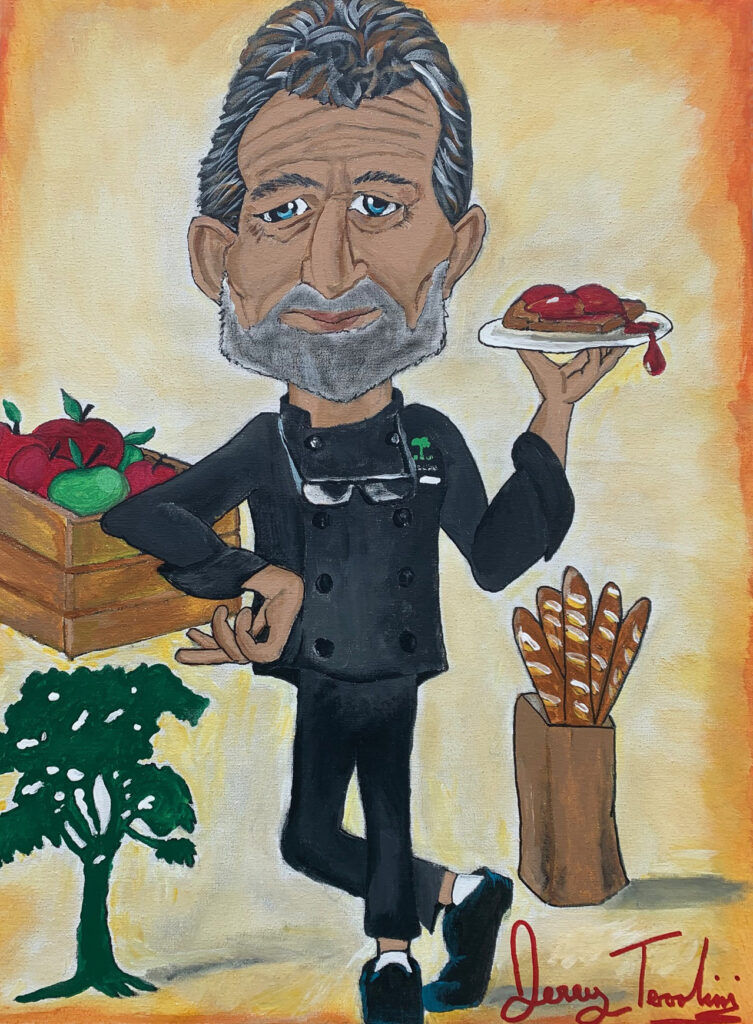
Some of his most satisfying moments have been introducing students to some of the overarching operations of that enterprise, such as watching someone who has never held a knife before, or someone who “doesn’t know one end of a broccoli stalk from another,” develop over a few weeks or months to the point where they’re out picking vegetables in the garden, or skillfully chopping them up to serve in the KDU.
Some of Smith’s favorite memories of Brennan-Sawyer are in that same vein, saying he takes the time to teach kids how to do things. Smith remembers a student who broke off three axe heads in about 10 minutes trying to split wood. Brennan-Sawyer took him aside, and within a week Smith would see him with a huge smile on his face, chopping logs for the brick fire oven.
“Marty brings honor to work,” Smith said. “It doesn’t matter whether you’re mopping the floor, cutting vegetables or serving food in the KDU. All the work we do is honorable. It’s necessary. We don’t just make it up, and if it doesn’t get done, we notice. He has that ability to bring that sense, regardless of what you’re doing. And it’s hard to feel that when you’re taking out the trash.”
The KDU, and all of Putney, will be a different place without him.
“The experiences I’ve had here, in the kitchen, running the program. I have just been the luckiest person to have had this opportunity,” Brennan-Sawyer said.
But he’s ready to move on.
“My hope is whoever comes to replace me brings their own experience, but also their own ideas, looking forward farther than I would be able to if I stayed,” he said.
A New Book
At the end of the school year, Brennan-Sawyer will hang up his metaphorical toque blanche and hit the road.
His first stop: China to visit his son and expected grandchild.
“I’m going to teach myself how to pull noodles! It’s magic!” Brennan-Sawyer said. He also wants to finish hiking the John Muir trail in the Sierra Nevada mountains.
“What am I going to do when I retire? I’m going to ‘the range of light,’” he said. “It’s like I’m in a Lord of the Rings movie.”
And visiting North Macedonia is high on his list.
“What’s in Macedonia? Exactly! The culture there predates the Greeks.”
There are also adventures to be had closer to home. After living on campus for 32 years, he and his wife have “upsized” and bought a small house on a hill in Walpole, N.H. Built in 1800, at some point someone tore down the post-and-beam frame and replaced it with a 21st-century infrastructure, so it strikes a lovely balance between old and new.
“It makes sense in its place, yet it’s a very modern building,” Brennan-Sawyer said. “We think of it as our colonial condo.”
They plan to put on their own personal touches, while experiencing what it feels like to live in a new village — getting to know their neighbors, the community, the worthy activities, and learning who’s who and how things work.
No media items found.
But one of the things he’ll miss the most about Putney — aside from the people — is baking bread in the big brick oven.
“Bread-baking is a craft,” he said. “It’s only been in the last few years that I have come to appreciate the fact that I have a craft and I practice it.”
It’s true alchemy, he says.
“There’s science, but there’s also a magic part,” he said. “It’s always a miracle to look in that bowl and go — ‘It’s alive!’ It’s growing. This is a living organism.”
Of course he can still bake bread at home, but it’s not the same without that massive oven — which by the way he helped design.
It’s a focal point for the school,” he said, “It’s our hearth. On those cold winter days imagine kids stumbling over after shoveling manure in the barn. It’s dark and windy, and they’re sitting in front of a fireplace that’s also connected to producing food for them.”
For years, Brennan-Sawyer has helped provide sustenance for an entire school. Friends, who in time become more like family, have gathered daily to break his bread together. One of the things he’ll miss the most are taking those calm, solitary, 20 or 30 minutes in the middle of a busy, chaotic day to stand in front of a fire and shape the loaves that will fill the stomaches of hundreds of hungry students and staff with nourishment, pleasure and warmth. It’s those meditative moments of perfecting a craft he treasures, to care for a community he loves.
“All other things aside,” he said, “this, in some ways, gives me the most satisfaction.”


